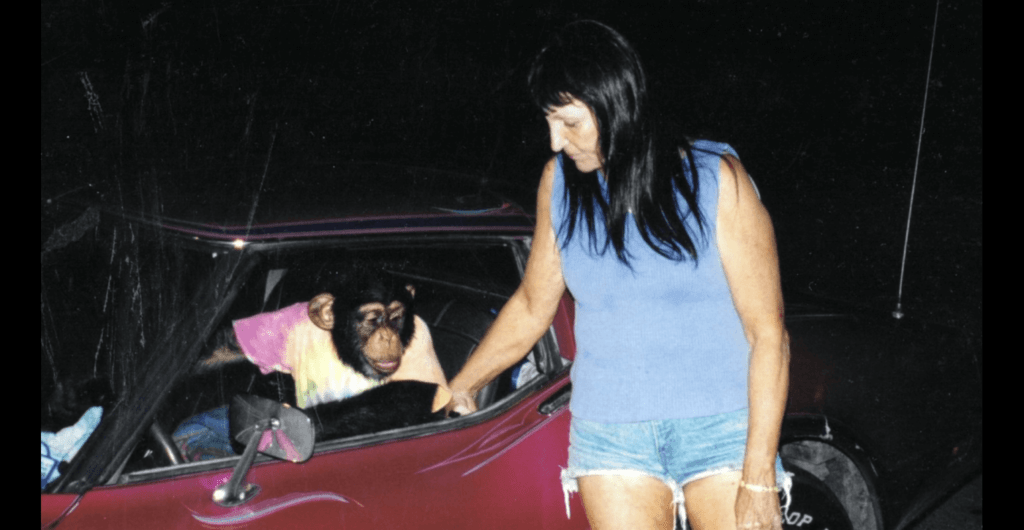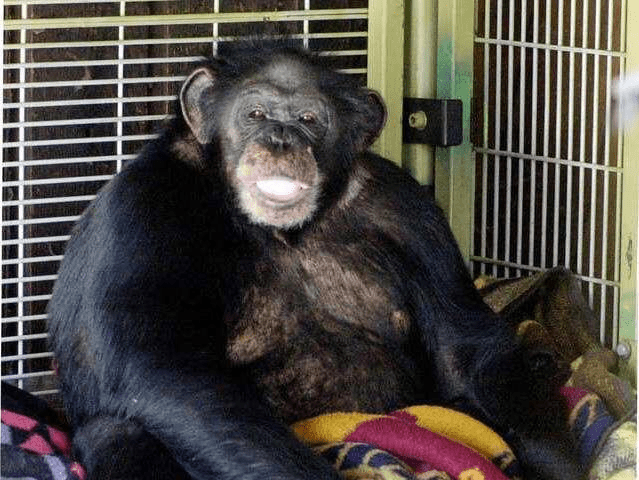
The Cautionary Tale of Travis the Chimpanzee (Chimp)
Travis, the chimpanzee whose life and death captured national attention, represents one of the most poignant examples of the complex relationship between humans and wildlife.
Here is a comprehensive look at Travis‘ story, exploring the themes of animal rights, human safety, and the ethics of exotic pet ownership.
Trending Now!!:
Early Life and Upbringing
Travis was born in 1995 and sold to Connecticut woman Sandra Herold when he was just three days old. Sandra and her husband, Jerome Herold, raised Travis as if he were their child, treating him affectionately and integrating him into their daily lives.
Travis was often dressed in human clothes, ate at the table with the Herolds, and even learned to perform simple tasks like washing dishes, driving a car, and using a computer.

The Public Chimp
Travis became somewhat of a local celebrity. He appeared in TV commercials, most notably for Coca-Cola, and even visited a local fire station. His human-like behaviors and the unusual lifestyle he led fascinated many, with the Herolds often showcasing Travis‘ capabilities. However, this public persona masked deeper issues regarding the suitability of keeping such a wild animal in a domestic setting.
The Incident
The tranquility of this unconventional upbringing shattered on February 16, 2009. That day, Travis attacked Sandra Herold‘s friend, Charla Nash, who was visiting the Herold home.
The attack was brutal, leaving Nash with devastating injuries, including severe facial disfigurement. Despite efforts, Travis was uncontrollable, leading to the police officer’s decision to shoot him. Travis died from his injuries, and Nash underwent extensive reconstructive surgeries.
Aftermath and Public Reaction
The incident sparked widespread debate and media coverage. Questions arose about the ethics of keeping chimpanzees as pets, the underestimation of their strength and potential aggression, and the responsibilities of exotic animal owners. The Herolds faced legal scrutiny, and the attack prompted stricter laws regarding the ownership of primates and other exotic animals in Connecticut and beyond.

Animal Rights and Ethical Considerations
Travis‘ story underscores the ethical dilemmas in animal-human interactions:
- Animal Rights: Advocates argued that Travis’s behavior could be seen as an expression of his nature, constrained by an environment unsuitable for a chimpanzee. The incident highlighted the need for natural habitats and the dangers of anthropomorphism.
- Human Safety: The attack raised questions about public safety, leading to increased regulations and bans on owning primates in various states.
- Exotic Pets: The case contributed to a broader conversation about exotic pets, emphasizing the importance of understanding the animal’s natural behavior over their potential for human-like companionship.
Legacy
Travis’s legacy is a complex mix of fascination, tragedy, and lessons learned. His life and death have contributed to:
- Educational Programs: Increased awareness and educational efforts regarding the nature of wild animals.
- Legislation: More stringent laws on exotic pet ownership should be passed to prevent similar incidents.
- Animal Welfare: A push towards sanctuaries where animals like Travis can live more naturally, albeit still in captivity.
Travis the Chimp‘s story is a stark reminder of the boundaries between humans and wildlife, urging a reevaluation of our relationship with nature. It serves as a cautionary tale about the consequences of crossing those boundaries, not just for human safety but for the animals’ well-being.
